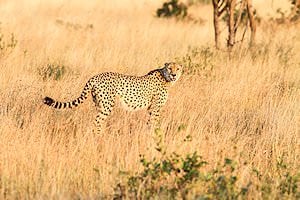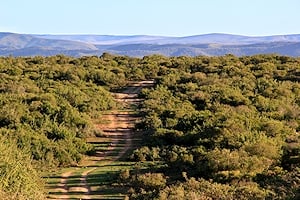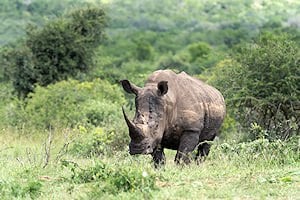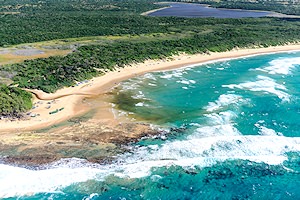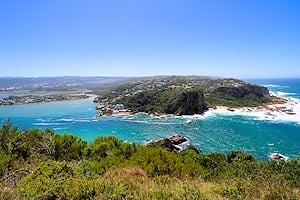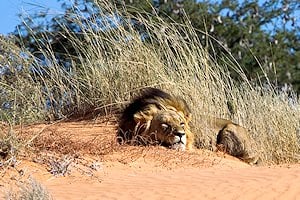Mokala National Park
Mokala National Park is a place of dramatic beauty where visitors can enjoy tranquility in natural surroundings. It is a wildlife sanctuary located 70km southwest of Kimberley in South Africa's Northern Cape Province. The landscape consists mainly of vast plains dotted by striking hills. It is a unique safari destination that African Sky can include in custom packages.
Need Advice?- Home
- >>
- African Travel
- >>
- South Africa
- >>
- National Parks
- >>
- Mokala National Park
Overview
South Africa's newest national park is home to several endangered species, including white and black rhinos, roan, and tsessebe. At Mokala, you can view many examples of ancient rock art created by the San.

The park exists where the Kalahari meets the Karoo. Mokala is a Setswana name given to the camel thorn. These trees are found in the park's dry woodland and sandy areas. They are one of the critical tree species found in the desert regions of the southern parts of Africa and provide staple food for most of the large animals in the park. Fifty species of mammal occur here.
Reasons to Visit
Incredible Wildlife
Visitors can view some of South Africa's unique antelope species at Mokala. The stately roan, sable, and the tsessebe, the fastest antelope species in Africa, can be viewed. The park is also a haven for bat-eared foxes, aardvarks, and brown hyenas. On rare occasions, you may even encounter the endangered pangolin.
Stargazing
The dry and clear air at Mokala and the absence of light pollution make Mokala an ideal stargazing destination. The Northern Cape's star-studded skies attract both novice and professional photographers and amateur and professional astronomers. Look up and be amazed when you visit this region.
Bird Watching
The sparse vegetation at Mokala and the limited water sources make birdwatching and photography once spotted easier than at some of the most densely vegetated parks in the eastern part of South Africa. Keep an eye out for the variety of kingfishers found here.
Experiences to Savor at Mokala National Park
The avid nature lover will find ample experiences to savor when visiting this national park. We highlight a few.
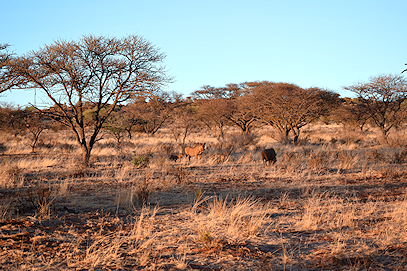
Tree dotted Plains
The transition zone between the Kalahari and Karoo Biomes creates a most remarkable display. Vistas from the many hilltops often have the appearance of a canvas perfectly proportioned and dotted with the impressive camel thorn tree. The views from these hills seem ever-changing no matter where your gaze falls.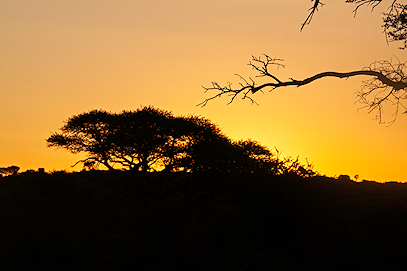
Amazing Sunsets
Fiery red sunsets herald the end of each day with colors vividly painted across the skies of this semidesert wonderland. Pick a tranquil spot during the late afternoon, pour your favorite drink, observe and relax as mother nature creates a remarkable display - a spiritual experience.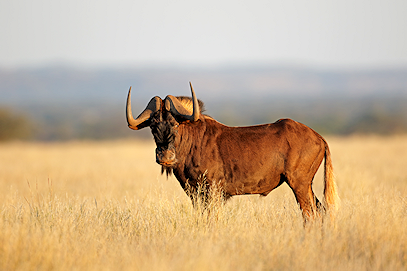
Remote Isolation
At Mokala, you leave civilization and the cares of daily life for a respite in the wilderness. There are no crowds here, as is often the case at some of the more popular and visited national parks in South Africa. You will experience a sense of remote isolation not easily found elsewhere.FAQ
Useful Travel Info
By Air
It is about 900km from Cape Town to Mokala and roughly 575km from Johannesburg. The safaris and tours we offer will typically overnight at other destinations before visiting Mkuze. In all cases, you travel in a private air-conditioned vehicle.
By Road
It is about 900km from Cape Town to Mokala and roughly 575km from Johannesburg. The safaris and tours we offer will typically overnight at other destinations before visiting Mokala. In all cases, you travel in a private air-conditioned vehicle.
Spring (September and October) and autumn (April and May) are generally the best months to visit the region, though spring can be arid. Mid-summer is extremely hot, while winter can be freezing, especially during the evenings and early mornings.
The official proclamation of Mokala took place in 2007. It is the newest of all national parks in South Africa and came into existence after the de-proclamation of Vaalbos National Park. Mokala's ancient human history reflects in the rock art found throughout the park.
Many different antelope species occur at Mokala; you will see the eland, the largest antelope in South Africa, and its fastest - tsessebe. Other notable species include red hartebeest, buffalo, kudu, springbok, gemsbok, roan, sable, black and blue wildebeest. The smaller species include steenbok and duiker, as well as klipspringer.
You will encounter white and black rhinos, giraffes, and ostrich. The largest predator you can spot is the black-backed jackal. The reserve is also home to aardvark, bat-eared foxes, and large herds of zebra.
The terrain and vegetation are characterized by open plains dotted with hills and rocky outcrops. Scattered across the plains are numerous. Mokala is in the transition zone between the Kalahari and the Karoo biomes creating unique terrain not found elsewhere.
You can book a guided game drive or traverse the park in a self-drive vehicle in search of the rare and more common animals found here. The Riet River offers fly-fishing opportunities, and two 4X4 trails offer the adventurous a great off-road experience. Several picnic spots are ideal places to relax and enjoy the environment.

